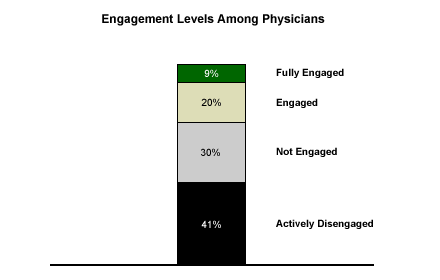This is the first article in a two-part series about physician engagement.
What does a physician need when working in a hospital or for a healthcare plan? Tangible needs -- such as good surgical scheduling, competent nurses, and accurate and efficient claims processing -- are easy to measure. However, the meeting of intangible needs, though harder to assess, is also critical to managing the physician relationship.
In a study of 2,000 doctors practicing at hospitals ranging from smaller suburban facilities to urban teaching and research centers, Gallup found that fewer than one in three (29%) are either "engaged" or "fully engaged" to the hospital or care plan they belong to. Fully engaged" doctors are not only attitudinally loyal, but also have a strong emotional attachment to the institution; "engaged" doctors are less than completely loyal, but emotionally attached to their institutions. However, three in 10 (30%) physicians are "not engaged" and more than two in five (41%) are "actively disengaged," meaning they have little or no emotional attachment and no attitudinal loyalty to the hospital they work for.

So what's missing for these disengaged physicians? More specifically, what defines "emotional attachment" and how can healthcare organizations foster this attachment in their physicians? Gallup research has identified four components -- Confidence, Integrity, Pride and Passion -- that define the physicians' emotional attachment to their hospitals or care plans.
Confidence: Do physicians think their hospitals or care plans can always be trusted? Do they always keep their promises? The news here is not good. Only 11% of physicians are truly confident that hospitals or care plans both keep their promises and are trustworthy.
Integrity: Do physicians feel that hospitals or care plans treat them fairly, especially when problems arise? Again, the answer is usually no. Only 14% of physicians strongly agree that they are treated fairly.
Pride: How do physicians think that using a particular hospital or care plan reflects upon them as physicians? Are they proud to practice there? The news on this item is better, with one in four physicians saying they are proud to work with a particular hospital or care plan with which they are affiliated.
Passion: Do physicians view their hospitals or care plans as irreplaceable? Overwhelmingly, no. Only 6% of physicians express "Passion" for their hospital or care plan.
Key Points
The financial health of hospitals requires that physicians be engaged to the institution with which they are affiliated. Gallup has determined that there is a strong emotional component in physicians' attitudes toward their hospitals or care plans -- and that a majority of physicians rate this relationship poorly. This finding represents both a wake-up call and an opportunity for improvement for healthcare organizations.
In next week's story, we will take a closer look at each of the four indicators of emotional attachment, and discuss what healthcare organizations can do to improve physician ratings on each.